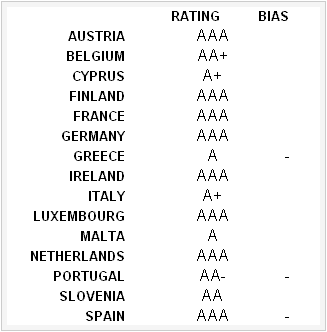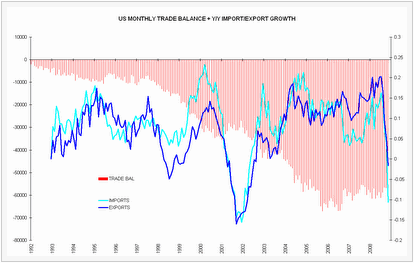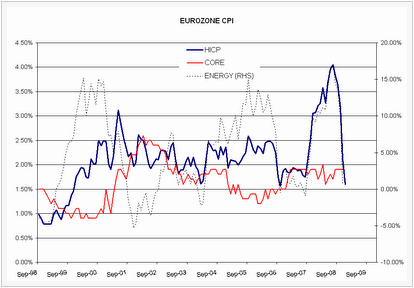Well, Macro Man highlighted the issue of trade yesterday, but even he was surprised by the US trade number for November. The $40.4 billion deficit was much better than expected, and indeed the narrowest in nearly 5 years. While Macro Man had been troubled by the October report and its implication for his constructive dollar view, yesterday’s data boosted his confidence in his economic analysis (though as observed yesterday, that does not necessarily translate into market success!)
What was particularly striking about yesterday’s figures was the sharp decline in both imports and exports, providing further support for yesterday’s theme. Macro Man received some pushback on his claim that the Baltic index represents true supply and demand for shipping (though why the unavailability of trade finance somehow doesn’t count as a determinant of shipping demand eludes him), so he was curious to see an article in today’s Torygraph suggesting that container rates on same routes have hit zero due to- you guessed it- falling demand.
Another source of curiosity yesterday came from a Market News story about tomorrow’s ECB meeting. It must have been a slow day chez MNI, as they evidently had the luxury of time to ring around a few different ECB moles. The divisions within the ECB were pretty much laid out for all to see; one guy pretty much said “we’re buggered”, 50 bps is a done deal, and we’ll push for more. Another was quoted as saying that the bottom may already be in and that they have to worry about eventual inflation.
Now Macro Man has had a go at the ECB before, and frankly been surprised at the amount of reader support for JCT and co. But frankly, he’s left wondering if we will need to create a new species for the ECB; traditionally, central bankers are divided into “hawks” and “doves”. Perhaps we’ll need to include “frogs” on the ECB…as in Kermit…as in Muppets. Where was this concern about the forward outlook in August, as oil was already on the way down? As things now stand, the ECB looks set to miss its inflation targt on the downside by as much as blew it on the topside. Good work, lads!
At the same time, there are more insidious structural headlines beginning to hit the tape. S&P, for all their many faults, have been conducting one of their periodic reviews of sovereign credit ratings over the past few days. Nations like the US and UK have had their ratings affirmed, while the PIGS are on negative watch (Ireland doesn’t show in the chart below for some reason.)

Now, Macro Man isn’t a Bernard Connolly type character who hates Europe for the sake of it. But he cannot help but wonder if the last year or so hasn’t put a dent in the attraction of the euro as a store of value. After all, many FX reserve holders in Asia and the Middle East have belatedly come to realize that holding euros isn;t any good iff you need dollars to defend your currency. That in and of itself would argue for a higher dollar weight than a purely markowitz approach would dictate.
Moreover, insofar as the current crisis has been all about the small print, the Eurozone has small print in adbundance. Less than half of the countries in the Eurozone enjoy a AAA rating (though obviously a bigger percentage of Euroland GDP is AAA), and recent market developments have confirmed that EMU assets, including government bonds, are not, in fact, perfectly fungible. BTPs are not a government trade these days, they are a credit trade.
And while Ireland may not call in the IMF, a worst-case outcome for the economy and the banking system could raise serious questions about some countries’ ability to pay their liabilities. Not exactly what you want to see in a reserve currency!
And try as he might, Macro Man cannot find the mechanism or gameplan within Europe should, say, Greece decide to withdraw from th single currency becuase they cannot afford their euro liabilities. The standard European respeonse seems to be “we don’t need a plan because that cannot happen.”
Funnily enough, that sounds an awful lot like S&P’s comments on their subprime housing model should house prices decline in the recent Michael Lewis article (page 5, to be precise). And didn’t that end well…..
- Bulenox: Get 45% to 91% OFF ... Use Discount Code: UNO
- Risk Our Money Not Yours | Get 50% to 90% OFF ... Use Discount Code: MMBVBKSM
Disclaimer: This page contains affiliate links. If you choose to make a purchase after clicking a link, we may receive a commission at no additional cost to you. Thank you for your support!




Leave a Reply